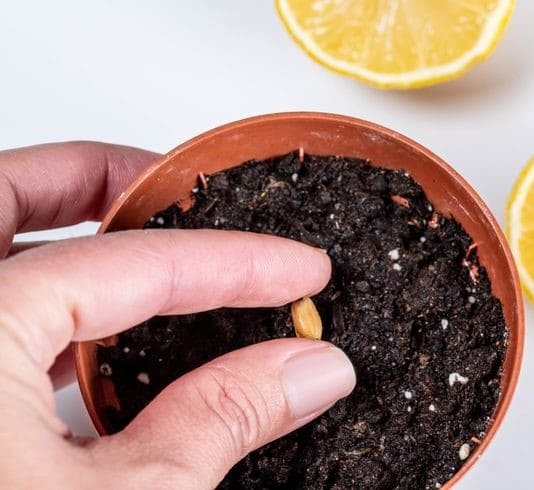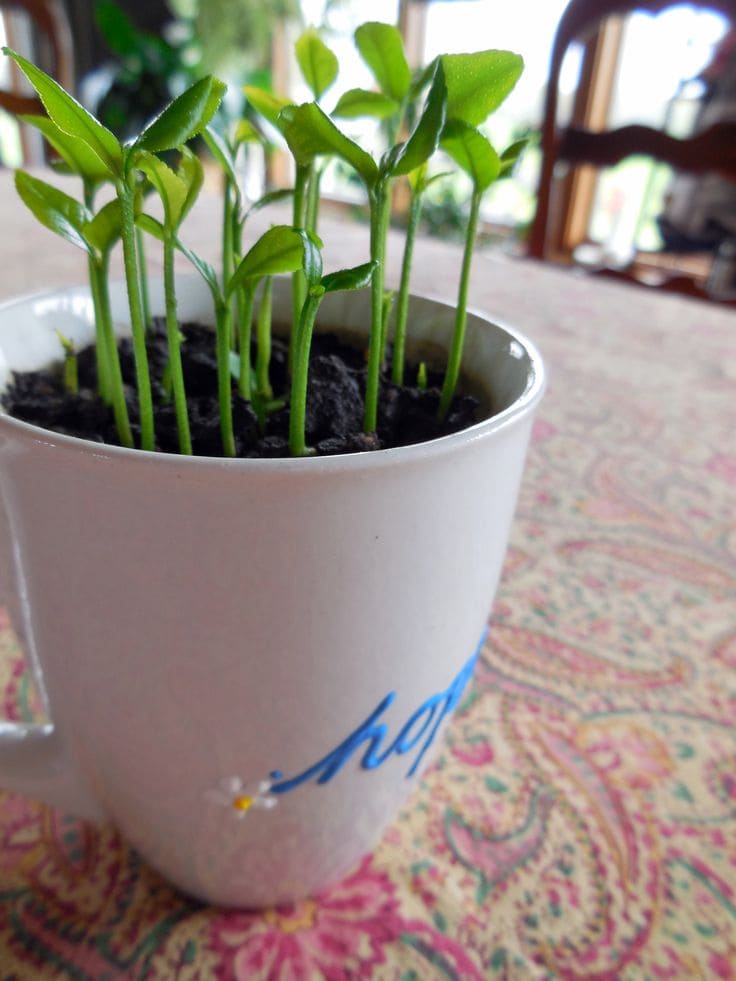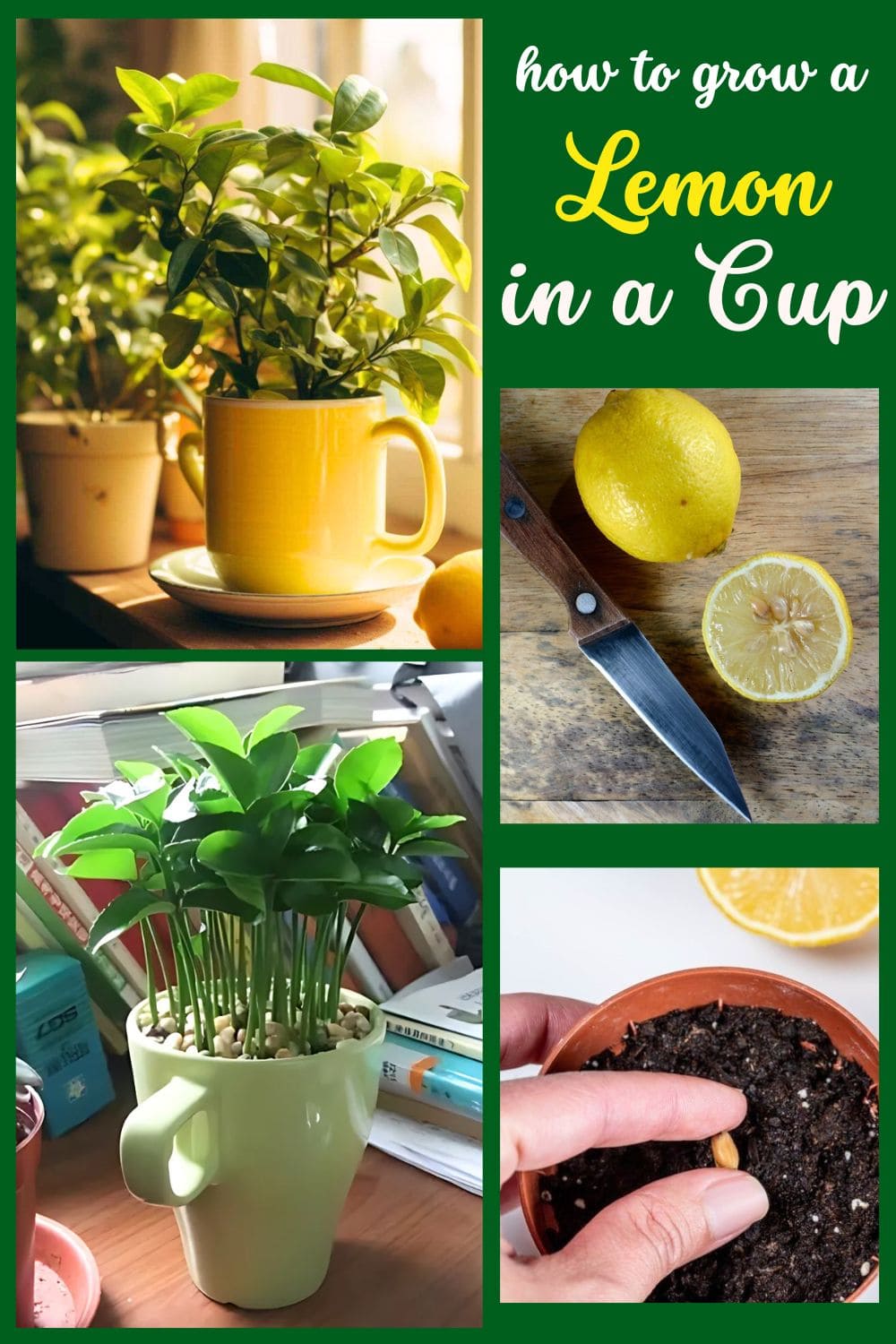There’s something magical about the fresh, citrusy scent of lemons. It can brighten your mood, energize your mind, and even make your space feel cleaner and more inviting.
But did you know that you can grow a lemon plant right in a cup at home? Not only does this bring a touch of nature indoors, but it also fills the air with a refreshing aroma.
As someone who has experimented with growing plants in all kinds of ways, I can tell you that this is one of the simplest yet most rewarding gardening projects you can try.
Why Grow a Lemon in a Cup?
Lemon plants are known for their glossy green leaves, fragrant flowers, and, of course, their citrus scent.
Even if your plant never produces full-sized lemons (since indoor lemon trees don’t always fruit), just the leaves and small seedlings alone will release a wonderful aroma when touched.
Plus, caring for a lemon seedling can be a relaxing, rewarding experience, perfect for reducing stress and adding a bit of nature to your daily routine.
Growing lemon in a cup is an easy way to bring this beautiful scent into your home without needing a large garden or even a pot. It’s ideal for small spaces, apartments, or even as a desk plant to keep your workspace smelling fresh.
What You Need to Get Started
You don’t need anything fancy to start growing your lemon. Here’s what you’ll need:
- A fresh, organic lemon (non-organic ones may have treated seeds that won’t sprout)
- A small glass or ceramic cup (with drainage holes if possible)
- High-quality potting soil or a mix of compost and sand for good drainage
- A spoon or stick to aerate the soil
- Plastic wrap or a small plastic bag (to create a greenhouse effect)
Step-by-Step Guide to Growing Lemon in a Cup
Step 1: Extracting and Preparing the Seeds
Cut open a fresh lemon and remove a few plump, healthy-looking seeds, then rinse them well under running water to remove any pulp, as leftover fruit residue can cause mold or rot.
Soak the seeds in warm water for about an hour to soften the outer coating. Some gardeners even peel off the outer seed coat to speed up germination, though this is optional.

Step 2: Planting the Seeds
Fill your cup with well-draining soil, leaving about half an inch of space from the top. Make a small hole in the center, about half an inch deep, and gently place the seed inside, pointed end down.
Finally, cover it lightly with soil and press it gently to ensure good contact. If you’re planting multiple seeds, space them out so they don’t compete for nutrients.

Step 3: Creating the Perfect Growing Conditions
Since lemon seeds love warmth and humidity, cover the top of the cup loosely with plastic wrap or a plastic bag. This helps trap moisture and creates a greenhouse effect, speeding up germination.
Next, place the cup in a warm, sunny spot, such as a windowsill that gets at least 6-8 hours of sunlight a day. If natural light is limited, you can use a grow light to support its growth.
Step 4: Watering and Maintenance
Overwatering is a common mistake that can cause seeds to rot. The best way to water is by misting the soil or adding a few drops of water at a time.
As soon as you see tiny sprouts emerging in about 2-4 weeks, remove the plastic cover and continue caring for the young plant by keeping the soil evenly moist.
Step 5: Encouraging Growth and Fragrance
Once your lemon seedling has grown a few leaves, you can gently rub them between your fingers to release the natural citrus scent. The more the plant matures, the more fragrant it becomes.
If you want to enhance the scent further, you can place the plant in a warm spot, as heat helps release more of its natural oils.

How the Lemon Plant Enhances Your Mood
Lemon plants aren’t just visually appealing; they have a powerful effect on your mood. The fresh, citrusy scent has been shown to reduce stress, increase focus, and even boost energy levels.
This is why many people use lemon essential oils in aromatherapy. But why use bottled oils when you can grow the real thing? Simply having a lemon plant in your space creates a natural, refreshing atmosphere that promotes relaxation and mental clarity.
If you place your lemon cup on your work desk, near your bed, or in the kitchen, you’ll notice a subtle yet refreshing change in the air.
Even brushing against the leaves as you walk by will release a burst of fragrance. Plus, caring for a plant, even something as small as a lemon seedling, adds a sense of mindfulness and joy to your daily routine.
How to Keep Your Lemon Plant Thriving
As your lemon plant grows, it may eventually outgrow the cup. At this point, you can transfer it into a slightly larger container with proper drainage.
If you live in a warm climate, you can even move it outdoors once it’s sturdy enough. Keep feeding it with occasional diluted fertilizer or compost tea to ensure strong, healthy growth.
If you want to keep it small, simply prune the leaves lightly to maintain a compact size. Even as a small plant, it will continue to give off its delightful citrus scent.

